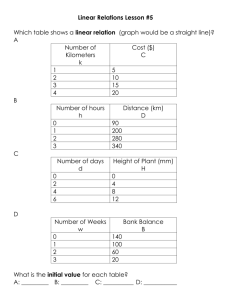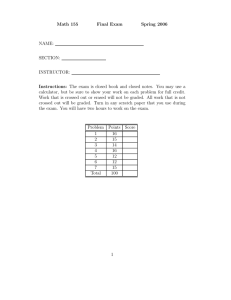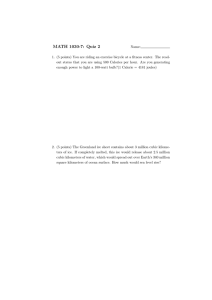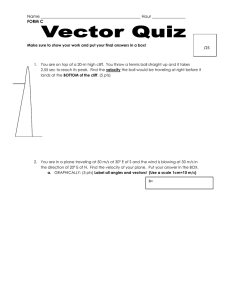Math 155 Final Exam Spring 2007 NAME:
advertisement
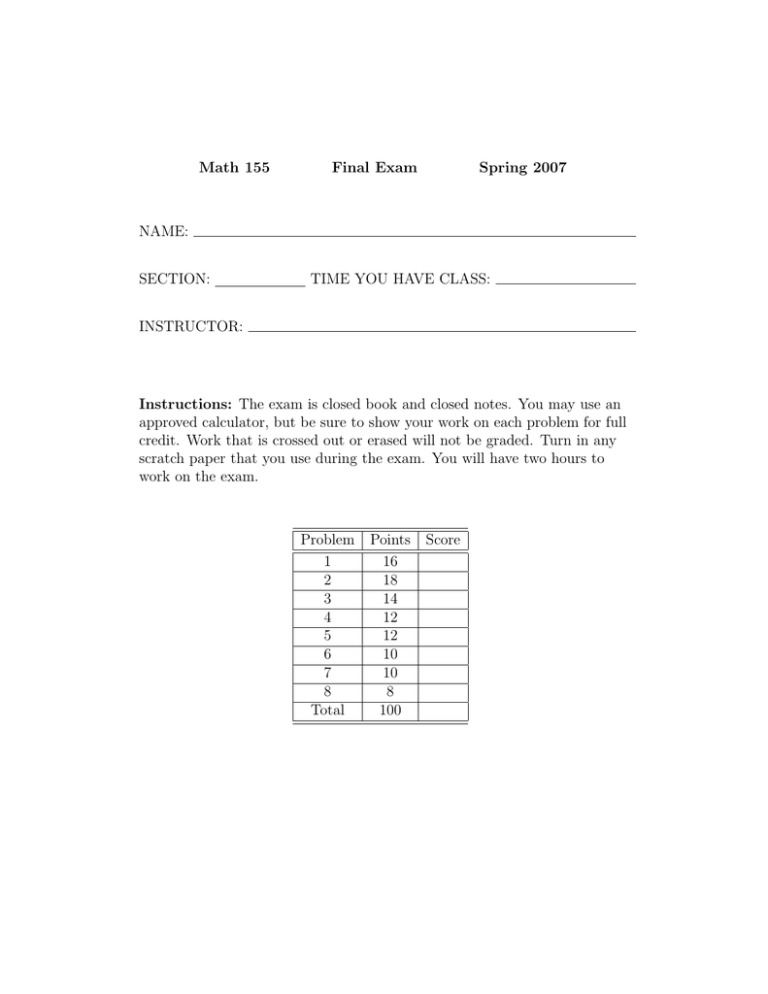
Math 155 Final Exam Spring 2007 NAME: SECTION: TIME YOU HAVE CLASS: INSTRUCTOR: Instructions: The exam is closed book and closed notes. You may use an approved calculator, but be sure to show your work on each problem for full credit. Work that is crossed out or erased will not be graded. Turn in any scratch paper that you use during the exam. You will have two hours to work on the exam. Problem 1 2 3 4 5 6 7 8 Total Points 16 18 14 12 12 10 10 8 100 Score 1 1. (16 pts) Find the derivatives of the following functions. You do not have to simplify your answers. Be sure to use parentheses to indicate multiplication where appropriate. (a) f (x) = cos(x2 + 3x + 10) 3) (b) f (x) = esin(x (c) f (x) = ln(x−2 + x3 ) (d) f (x) = x4 − 9x + 12 x5 + 2x + 3 2 2. (18 pts) Evaluate the following definite and indefinite integrals. If necessary, use u-substitution. Z (a) Z sin(3x) + e−4x dx 2 (b) √ x2 x3 + 4 dx 1 Z (c) ln(x) Z (d) 0 1 1 dx x 3x dx +2 x2 3 3. (a) (7 points) Evaluate the improper integral. If necessary, use u-substitution. Z ∞ 2 xe−x dx 1 (b) (7 points) Use integration by parts to evaluate the indefinite integral. Z xe2x dx 4 4. (12 points) Let f (x) = 13 x3 − 92 x2 + 18x − 18. (a) Find f 0 (x) and f 00 (x). (b) Verify that x = 3 is a critical point. What are the other critical points? (c) Is there a local maximum, a local minimum or neither at x = 3? Justify your answer using the first or second derivative test to receive full credit. (d) Find the global maxima and global minima of f (x) for 2 ≤ x ≤ 4. Express your answers as coordinate pairs. Justify your work to receive full credit. 5 5. (a) (6 points) The Stability Test/Slope Criterion can be used in some cases to determine the stability of an equilibrium. For each given value of f 0 (x∗ ), assign a conclusion based on applying the Stability Test/Slope Criterion. Value of f 0 (x∗ ) If f 0 (x∗ ) = 0, then If f 0 (x∗ ) = 1, then If f 0 (x∗ ) = −3, then (b) (4 points)Let pt+1 = rpt , rpt −s(1−pt ) Conclusions a) x∗ is stable b) x∗ is unstable c) x∗ is half-stable d) x∗ is neither stable nor unstable e) The test is inconclusive where s 6= r and s > 0, r > 0. i. Is 1 an equilibrium of this discrete-time-dynamical system? Why or why not? ii. Is 2 an equilibrium of this discrete-time-dynamical system? Why or why not? (c) (2 points) The following graph models a discrete time dynamical system; use it to answer the following questions. i. If a < Y0 < b, what is the long-term behavior of this system? ii. If Y0 > b, what is the long-term behavior of this system? 6 6. (10 pts) The Optimus function measures velocity of a semi-truck with respect to time t. Optimus(t) = 14t + 10, in miles per hour. (a) (3 points) Peter Cullen drives the semi for 3 hours, starting at t = 0. How far did Peter drive? (b) (3 points) What was the acceleration of the semi at time 2? (c) (1 point) Interpret Optimus0 (t) in words: R (d) (1 point) What are the units on (Optimus0 (t))dt? (e) (2 points) On Cybertron, all velocities are measured in kilometers per hour. Circle the best answer below for the correct function giving the velocity in kilometers per hour. Let Ō represent velocity in kilometers per hour. (1 mile = 1.61 kilometers) 14t + 10 i. Ō(t) = 1.61 t ii. Ō(t) = 14 1.61 + 10 iii. Ō(t) = 14 · 1.61t + 10 iv. Ō(t) = (14t + 10)1.61 v. None of the above. 7 7. (8 points) (a) Find the leading behavior at infinity and zero for re2x + x−2 f (x) = 3 . ax + bx2 + cx + d a, b, c, d, r are all positive constants. i. f∞ = ii. f0 = (b) Use the Method of Matched Leading Behavior to sketch a graph of g(x) knowing only that g0 (x) = x2 and g∞ (x) = 10. 8 8. (8 points) Let dF represent the rate of food comsumption during a dt summer BBQ in pounds per hour. (a) Use the table to estimate the total amount of food consumed between times 1 and 3 using a Right Hand Riemann sum with 4 subintervals. dF t dt 0 1 0.5 1.3125 1 1.5 1.5 1.5625 1.5 2 2.5 1.3125 1 3 (b) If dF = −.25t2 + 0.75t + 1, find the exact amount of food dt consumed between times 1 and 3.
